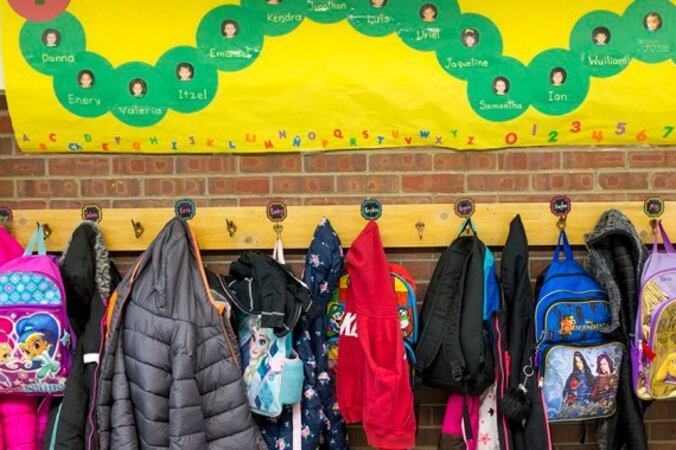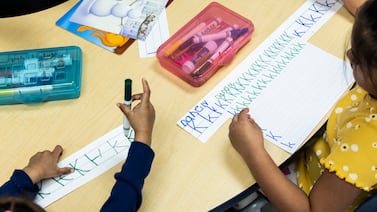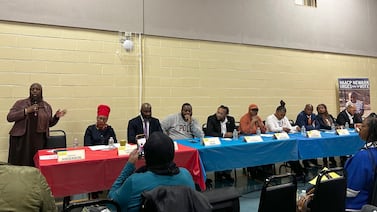Colorado’s State Board of Education is growing from seven to nine seats, and political control of the body that sets education policy could be at stake in November’s election.
The addition of two seats due to Colorado’s growing population — one representing a new 8th Congressional District that includes Adams and Weld counties and another statewide at-large seat to maintain an odd number of board members — introduces new dynamics into the election.
The new 8th Congressional District is considered the most competitive in the state, with a large share of Hispanic voters. The at-large seat will require candidates to appeal to a broad cross section of voters and raise money to get their message out.
On the State Board of Education, Democrats say they have a track record of positive change and will focus on student needs rather than ideology. Republicans say they’ll center parents’ rights and school choice, focus on core academic skills, and block efforts to promote a more inclusive approach to teaching race, gender, and sexuality. Republicans are seizing on issues that have animated voters nationally and locally in a backlash to more progressive approaches in the classroom.
While races at the top of the ticket — governor, U.S. House, U.S. Senate — will draw far more attention and money, Republicans hope they can leverage voter concerns about education — alongside inflation and public safety — to gain ground in a state where Democrats control all levers of state government.
A recent Magellan Strategies poll found more voters think schools are on the wrong track: Democrats because they believe public schools are underfunded and under attack and Republicans because they believe left-wing ideology has supplanted academics.
The election comes as schools are still grappling with the effects of the pandemic and on the heels of contentious school board races in 2021 that saw more conservative candidates take control in many Republican-leaning parts of the state, even as more progressive candidates prevailed in many large Front Range communities.
8th Congressional District draws Republican interest
Voters’ first decision — the only contested primary — will be in June’s Republican primary for the 8th District. Peggy Propst, a former State Board member and county commissioner who recently moved to the district, faces Cody LeBlanc, a young school board member and political activist from Weld County.
Propst, who recently married, represented the Colorado Springs area on the State Board from 2004 to 2010 as Peggy Littleton. She wants to support the state’s efforts to improve reading instruction and represent parents who didn’t like what they saw in remote learning.
“People are upset about their kids’ education, and they should be, and I can do something about this so we can get back to the true way where we focus on the things that matter,” Propst said.
LeBlanc said he’ll be an advocate for local control and hopes a Republican-controlled State Board can serve as a check on the legislature, if Democrats retain power.
“Why is the state mandating what we teach in our classrooms if we’re a local control state?” he said. “One reason I want to be on the State Board is to return power to local school districts.”
Both want to revamp Colorado’s standards, which are based on the Common Core. Propst voted against them in 2010 as a State Board member, while then-12-year-old LeBlanc protested against them as the founder of Teenage Republicans of Northern Colorado.
The primary winner will face Democrat Rhonda Solis in November. Solis just completed two terms on the Greeley-Evans school board. Solis is vice president of the Latino Coalition of Weld County and active on community issues. Solis said she wants to support teachers who have “really taken a beating” in recent years and make sure students have access to high-quality neighborhood schools.
Solis said policy needs to address access, not just equity. It’s not enough to provide materials in other languages if parents can’t read or open a new charter school if students can’t get across town.
“One thing that’s been very different for me is being the only Latina on a school board [in a district] that is more than 50% Latino,” she said. “I would bring up things that other people were not bringing up. I think there is a lens I can bring that is not represented right now, and I think that’s really important given the population of Colorado, the population of CD-8.”
The Cook Political Report rates the 8th Congressional District a toss-up in the U.S. House race. The district includes young families priced out of Denver and multigenerational Colorado families. Four in 10 district residents are Hispanic, a group that consistently rates education as a top issue. But they’ll need to be engaged, said Alvina Vasquez, a Democratic political consultant.
“When you look at the economic challenges that a lot of families have, voting isn’t always a priority,” Vasquez said. “It will require engaging at a really grassroots level. That’s what will decide who the winning candidate is.”
At-large race could revisit pandemic leadership
In the new at-large seat, former Adams 12 school board President Kathy Plomer, a Democrat, is running against Republican Dan Maloit, a veteran and St. Vrain Valley School District parent who became politically active arguing for schools to reopen.
Maloit said he wants to support teachers, get back to basics, and bring a parent perspective. A founder of the Colorado Alliance for In-Person Learning, Maloit said voters will — and should — remember decisions made in 2020 and 2021.
“We both said we wanted kids back in school,” Maloit said. “She was a school board president, and those kids stayed out of school pretty long. I said, ‘I want to get back in school,’ and I risked my family’s livelihood and personal reputation to put them back in there. I think that that’s going to matter.”
Plomer said she’s happy to have that debate. Board members made the best decisions they could with the information they had at the time, she said, while facing criticism from all sides.
But she prefers to talk about what kids and schools need now. She first got involved years ago as a parent volunteer when her oldest started kindergarten, and she served on the Colorado Association of School Boards’ executive committee, a position she says exposed her to issues facing districts around the state, including in far-flung rural districts.
“At this time, we need people who understand the system,” she said. “There are no soundbite answers to our questions. We need to have tough conversations.”
Experienced board members focus on different issues
Two incumbents are up for re-election, Democrat Rebecca McClellan in the diverse 6th Congressional District, which covers Aurora, Littleton, and other southeastern suburbs, and Republican Steve Durham, who represents the solidly red 5th Congressional District in El Paso County.
McClellan’s election in 2016 flipped the board blue.
McClellan is being challenged by Molly Lamar, a Cherry Creek parent and district critic who has appeared on national conservative media. Lamar could not be reached for comment. Her website lists her priorities as school safety, including adding police to schools, curriculum transparency, and partnering with parents to improve outcomes. Christopher Otwell also is running, as a Unity Party candidate.
McClellan said she’s proud of advocating for full-day kindergarten and behind-the-scenes work like ensuring schools aren’t penalized in their graduation rates when students stay a fifth or sixth year to earn college credit. Her focus now is supporting schools in pandemic recovery.
McClellan noted that many State Board votes are bipartisan and even unanimous, despite a 4-3 partisan split.
“It is my belief that this board is focused on outcomes for students,” she said. “Every now and again, you see differences in our approaches, but there is a strong commitment to improving outcomes.”
Even among this year’s candidates, there are many areas of agreement: ensuring students learn fundamental skills, making sure their options include college or a good-paying job, supporting teachers and providing resources to help them improve.
Board Vice Chair Durham is running for his second full term after being appointed in 2014. The long-shot Democrat in the race is Joseph Shelton, a campus security officer at Colorado College and graduate of Colorado Springs District 11 who went through a school closure in middle school. He wants to promote student well-being and paths to success other than college.
Durham said he’ll keep working to support charters and choice. He expects the next State Board will have to engage lawmakers on whether the board needs more tools to intervene in low-performing districts and what a future accountability system should look like. Durham has called for stronger intervention in the struggling Adams 14 school district, a situation that has challenged the role and authority of the State Board.
Obscure board plays important role
Colorado is somewhat unusual in having a separately elected State Board of Education that hires the education commissioner, rather than the governor appointing a commissioner. This division of power sometimes puts the State Board at odds with the legislature, which passes laws the State Board is supposed to implement.
The State Board handles charter appeals and can overturn school board decisions. The State Board also oversees assessments, the school accountability system, teacher evaluation, and licensure. That gives the board a role in getting more teachers into the classroom and determining what standards they’ll have to meet.
The board sets academic standards and is working to update social studies standards to be more inclusive, in accordance with a state law passed in 2019. That process has sparked intense conservative backlash, especially related to the inclusion of LGBTQ people and contributions. LGBTQ teachers and students, along with their parents, have pushed back, saying supportive school environments save lives.
The debate mirrors those in other states and is already an election issue. Republican candidates said they’re prepared to undo standards they see as too proscriptive or divisive or intruding on the authority of parents. Even under Democratic control, the board may strip many references to marginalized groups.
The prominence of cultural concerns this year marks a change, said Paul Teske, dean of the College of Public Affairs at the University of Colorado Denver.
“People are often fighting about something that is not as real as the policy issues,” he said. “But that has advantages for one side or the other, in this case for the conservative side who argue that parents are not getting what they want and schools are doing crazy things.”
Only about 30% of voters have children in school, meaning many have little direct experience with what’s happening in classrooms. Colorado public school parents, meanwhile, are more diverse and lower income than the active voter population.
In the past, education reform and funding dominated the debate, Teske said, with Democratic supporters of reform finding common ground with Republicans on school choice, charters, and a strong accountability system.
Republican Party Chair Kristi Burton Brown believes Republicans can ride parent frustration to a State Board majority that will be even friendlier to charter schools and choice.
“[Parents] want their kids in school, they want transparency in the curriculum, they want a say in their children’s education, they want access to better schools,” she said. “And those are all things Republicans care about and Democrats largely do not.”
As a relatively obscure office, State Board of Education elections are likely to follow the political winds of the state and congressional district, said Courtney Sievers, director of survey research at the polling firm Magellan Strategies. Economic conditions might favor Republicans, but Colorado is increasingly blue.
“People trust Democrats more on education,” she said. “Republicans have not really done much to move voters. Especially women.”
Jen Walmer, head of the Colorado chapter of Democrats for Education Reform, said political control matters. For example, the state plan to spend federal funds focuses on equity and children’s emotional health alongside academic issues, a balance she sees as exemplifying the Democratic approach.
“There is a real risk of right-wing ideologues seeing the State Board of Ed as a platform to push an agenda,” she said. “I think parents around the state will be able to recognize political rhetoric that masquerades as education policy.”
Bureau Chief Erica Meltzer covers education policy and politics and oversees Chalkbeat Colorado’s education coverage. Contact Erica at emeltzer@chalkbeat.org.





